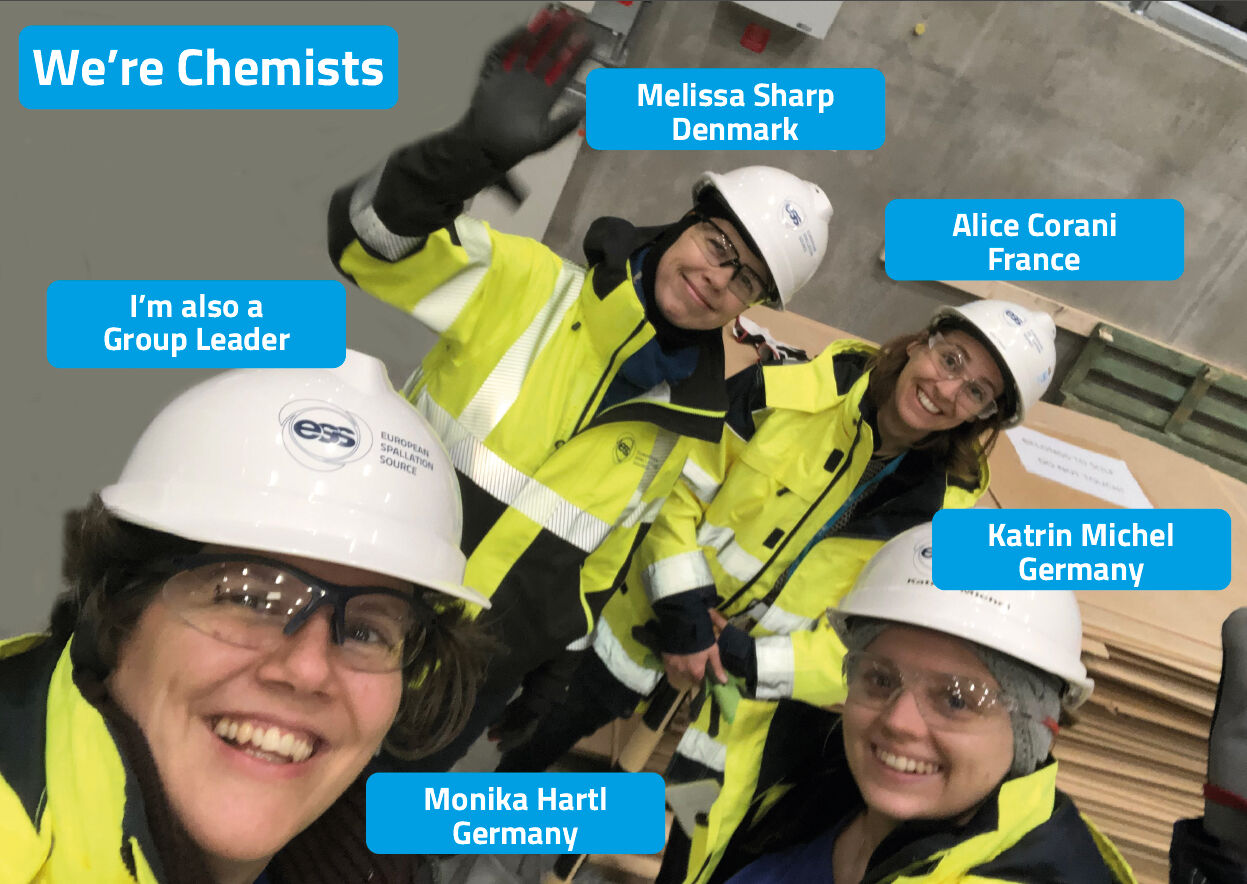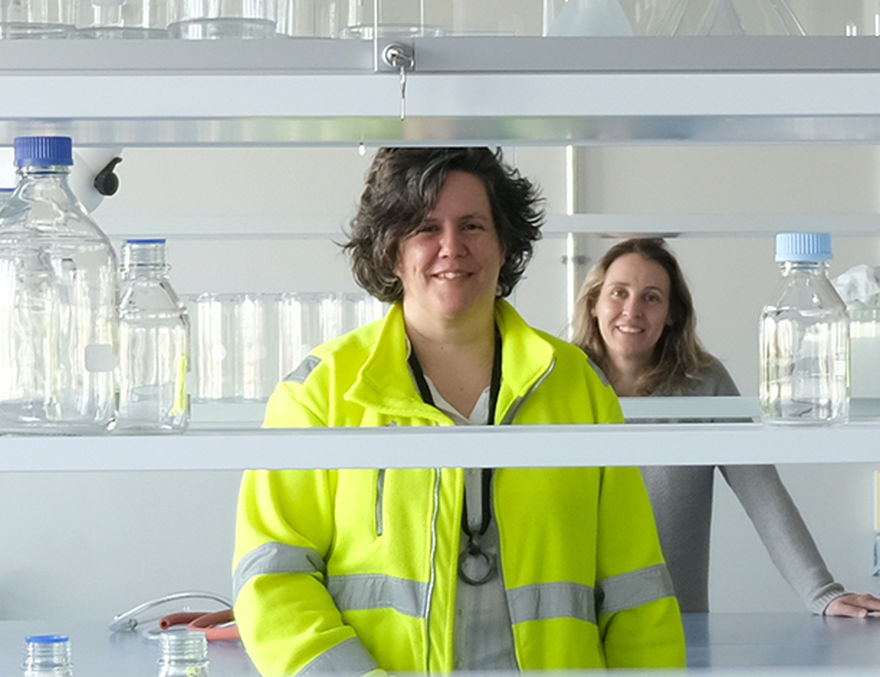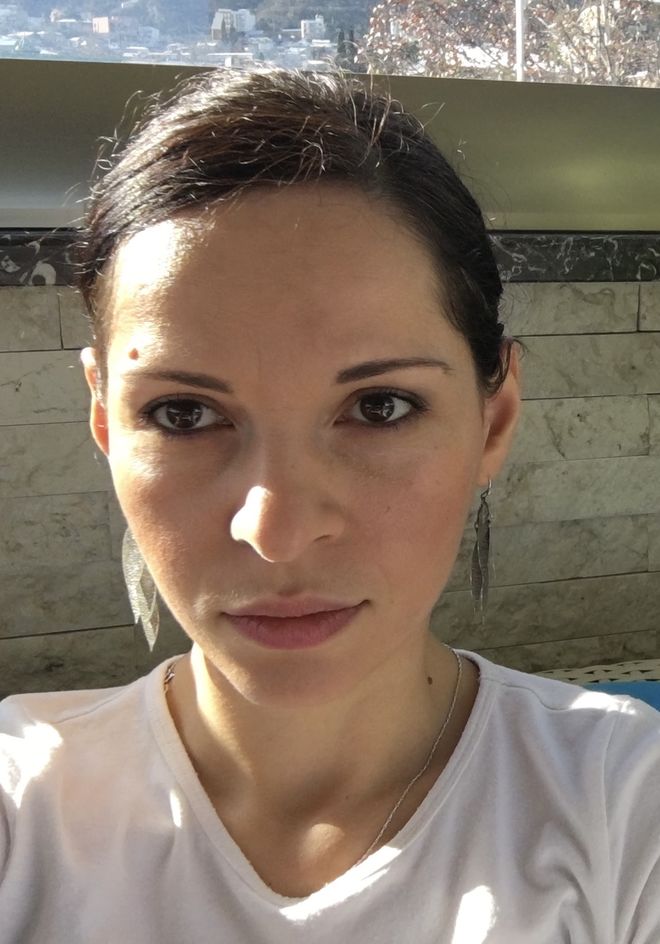
Do you recognise these amazing women? They were among a number of our colleagues featured in last year's photo campaign celebrating International Women’s Day.
This year we have chosen to highlight just two, and give you a look into their backgrounds, their roles and leadership, as well as what brought them to ESS in the first place.
With that said, we are very happy to introduce you to Monika Hartl, Group Leader for the Sample and User Laboratory Facilities (SULF), and Lali Tchelidze, Section Leader for Operations, two of our fantastic female colleagues here at ESS.
Monika Hartl
Tell us about your job
I head the group responsible for running the user laboratories that currently support the ESS project in chemistry and material analysis. Once ESS starts operating, we will be focused on supporting the researchers in sample preparation and handling during their neutron scattering experiments in our labs.
Tell us a little about your background
I grew up in Berlin, Germany, and ever since I was little, I was interested in how things work. My parents supported that by allowing me to take things apart, even though I was not always capable of repairing them or putting them back together. Sometimes I would go to my parents’ workplaces, both chemists, and got to observe what they were doing and was allowed to do fun things like playing with liquid nitrogen or using the microscope. Chemistry, physics and mathematics were my preferred subjects at school. So, when it came to deciding what to study, I chose the most hands-on subject of the three, chemistry, and I did not regret it - I still enjoy performing chemical experiments immensely.
What attracted you to ESS?
After my PhD in inorganic chemistry, I worked as a post-doctoral researcher at the neutron source in Los Alamos. I really enjoyed working in a large-scale user facility with researchers and staff from a wide variety of backgrounds. After a decade of being an instrument scientist in Los Alamos, becoming part of the construction of a new, bright neutron source for Europe was an interesting new challenge.
Did you always want to become a leader, or did this develop as part of your professional journey?
No, this developed gradually. At the beginning of my career I was not really aiming to become a leader, I enjoyed being a chemist in a laboratory, performing hands-on work and pursuing interesting research. After I took on the position as instrument scientist in Los Alamos, I started working a lot with technicians, students, and postdocs, so I naturally moved over to the role of mentor. This continued when I was hired as a material scientist at ESS in the Target Division, and later as the SULF project leader. So, when I had the chance to apply for the group leader position, I took it!
What are the key leadership lessons you have learnt?
I think the key to leadership is to support and encourage every member of the team to be successful. This includes showing them the exciting aspects and/or the impact of their work. It is also important for me to know what I am asking of my group; the actual work and what it takes to perform it. Basically, this means listening to each group member and ensuring they can concentrate on their work. I am very lucky to have a highly skilled group of people that need very little guidance, which means we can all, including me, focus on our core business.
What inspires and energises you most about your job at ESS?
The most inspiring part about my job at ESS is that I can learn new things every day. I can talk to colleagues with various backgrounds and nationalities and hear about how things function at ESS, as well as the challenges they encounter and the solutions they find. It is really motivating to see how everything is coming together to make the facility work. The SULF team often gets the chance to visit areas of ESS otherwise not accessible to everyone. If we can then help our colleagues by giving them some chemistry information they needed, it feels like a successful day.
Growing up, how important do you think it is for young girls to be exposed to role models from science, engineering fields and business?I think it helps both girls and boys to be exposed to role models, to start thinking about what kind of jobs are exciting to get into. What helped me personally was not so much the women role models I encountered but rather the excellent mentoring during my education I received from a (male) mentor. So yes, role models are important, but I feel good mentoring at various stages of your education, regardless of gender, is even more important.
What is the best professional advice you’ve received? What advice would you give to young women who aspire to lead in business or enter science or engineering?If you do what you love, you will be good at it. Don’t let anyone stop you!
Lali Tchelidze
Tell us about your job
I have been leading the operations section since 2018. The operations section is still a small team, but we are growing fast which makes the dynamic life at ESS even more interesting. We are an international team with various backgrounds but the high sense of responsibility and drive unites us in a common goal to contribute to making ESS a world class facility.
Tell us a little about your background
I grew up in Georgia, and when I was a child we would often share stories and discuss various topics as an entire family. My dad is a physicist who loves teaching children, and he filled many evenings with scientific discussions. I loved listening to him and, at the age of 11 when I started learning physics in school, I became fascinated by the topic. After finishing school, the obvious choice was to study physics, and I finished a theoretical physics bachelor degree at the Tbilisi State University at the age of 19. Soon after, an opportunity came up (a rare one at that time) to continue my studies in the US, where I spent four years completing my masters and PhD programmes.
What attracted you to ESS?
During my PhD studies I was researching the production of a high specific activity medical isotope, Mo-99, with the idea of using accelerators. I decided to learn more about accelerators as part of the research, and started attending various accelerator schools in the US, as well as in Europe. It was here I met my future husband, and as he was studying in Lund I got to travel to Sweden first time in my life. I decided to move to Sweden and got to learn about an emerging large-scale project, European Spallation Source, via a university professor. Within a couple of months, I was offered a job: this was back in 2010, and I’ve greatly enjoyed working here ever since.
Was it always your desire to become a leader or did you develop it along your professional journey?
A desire to become a leader came over time, as I noticed that I liked working with people a lot. I was given an opportunity to be involved in the early development of the beam loss monitoring system, in designing accelerator radiation shielding and coordinating licensing work for the accelerator division, and began heading the accelerator safety group. I later became head of the operations section.
What are the key leadership lessons you have learnt?
The key leadership lessons I’ve learned are that motivation is the key to success, and that it’s much more complex than I’ve imagined to really understand what drives people. At the same time, it’s fascinating for me to work with many different individuals.
What inspires and energises you most about your job at ESS?
The fact that I’m part of something meaningful is what inspires me. Working with many people and seeing good results is what energises me.
Growing up, how important do you think it is for young girls to be exposed to role models from science, engineering fields and business?
Role models played an important part for me in advancing in my carrier; at all stages. I think it’s an essential part of the development and even now look up to certain individuals that I consider being role models in their field.
What is the best professional advice you’ve received? What advice would you give to young women who aspire to lead in business or enter science or engineering?
This is a tricky one. I’d say the best advise as a leader is to be present and understand as much as possible about the daily work of the team that I lead.
Did you know it’s not only us at ESS that are highlighting our fantastic female colleagues?
Linda Robinson, Detector Coatings Section Leader at Linköping, was recently interviewed by Innovative Materials Arena. Read her interview here https://innovativematerials.se/news/ima-sustain-female-role-models-linda-robinson


























